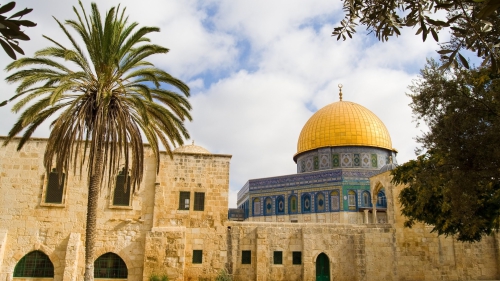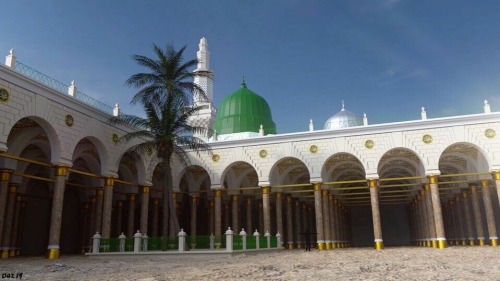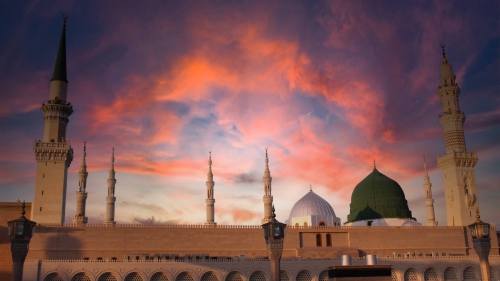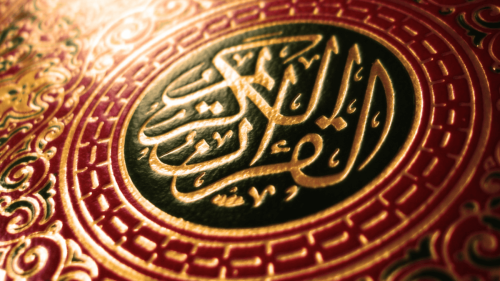Prophet Muhammad's Anxieties

Prophet Muhammad (peace and blessings be upon him) was the bravest and most courageous of all men, even though he was constantly targeted by the forces of evil from among men and jinn. He proved this exceptional attribute of his time and again throughout his arduous prophet-hood mission.
He even supplicated to Almighty God to save him from cowardice, seeing it as a spiritual and also a physical disorder. He invoked God thus: “O Allah, I seek refuge with You from worry and grief, and I seek refuge with You from incapacity and laziness, and I seek refuge with You from cowardice and miserliness, and I seek refuge with You from being heavily in debt and from being overcome by men” (Sunan Abi Dawud).
In passing, it should be observed that apart from cowardice, the Prophet also prayed against anything that can be disastrous for a person’s complete wellbeing, and that can incapacitate him from living a responsible, productive, and enjoyable life. In Islam, every person is to be an asset and a source of goodness, one way or another, in lieu of becoming a liability and a source of weakness as well as vice. Being a coward, certainly, is an impediment to the former and an express route to the latter.
The Prophet was brave because he was on the right path; he was God’s chosen one; he was the final Messenger to mankind and so, had God, His angels and all His devout servants as his protectors and friends; he preached, lived and embodied the absolute truth; he knew more than anybody else what actual bravery is, what it means to be brave, and how as well as why to be brave; he also understood more than anybody else how anomalous and ruinous cowardice may be, and why it was incompatible with a person whose purpose and mission in life transcended the vicissitudes of this transitory life.
With all these features on-board, the Prophet did not recognize any form of fear associable with this world and its people as mere mortals. He was always in touch with Heaven. He resided on a higher plane of meaning and experience. To him, fear was false and illusory. It existed only as an abstract concept, and was relative. It could force its limited and deceptive presence only in the actual absence of bravery and the truth.
The Prophet only feared God, in the sense that he loved and respected Him most. He perfectly knew Him and was awestruck and captivated by His magnificence and majesty. As a result, in everything he did, he humbly submitted to the Will and Power of God, fearing the consequences of not doing so. He was an example of God-consciousness and self-restraint.
In this manner, the Prophet nurtured his relationship with God, which was based on reciprocal love. While performing incalculable righteous deeds and shunning completely improper ones, the Prophet furthermore guarded himself against the undesirable consequences as could stem from damaging such a rapport with God, his Creator and Master.
It is against this background that the Prophet’s fear of God should be viewed. He did not fear God in the conventional sense of the term. Rather, he loved Him incalculably – and was likewise loved. He was ready to do whatever it takes so as not to jeopardize the given blessing and privilege. He felt indebted and was grateful.
In other words, the Prophet only loved – not feared - God, but feared things that had the potential to weaken his relationship with God. This was so because it is rightly said that you cannot love a person whom you fear. There is no room in the human heart for both fear and love towards the same person or thing.
In his capacity as the teacher of mankind, the Prophet taught, both in theory and practice, the meaning and significance of bravery, as opposed to the meaning and detriments of cowardice. His Sunnah (life pattern), as the second source of Islam and its civilization, is replete with such lessons. The aim is to keep producing generations of Muslims bent on following their Prophet in matters pertaining to his Sunnah in general, and his exemplary bravery in particular. It means the braver a person is, a better follower of the Prophet - and a better Muslim - he is.
The Prophet’s concerns for others
Although the Prophet feared nobody – except Almighty God – his being the kindest and most compassionate of men led him to constantly worry about others. For example, he was concerned about some people’s negligence and slow spiritual progress, about the potential consequences of their wrongdoing, about their ignorance and unwillingness to learn and get enlightened as much and as fast as he wanted them to, etc. He worried about their undesirable and unnatural actions, which were leading to correspondingly undesirable and unnatural outcomes.
He took the problems of his people most seriously, and they weighed heavily on him. His emotional wellbeing was significantly affected even by the polytheism and hypocrisy of his fiercest enemies. No wonder the Prophet Muhammad (peace and blessings be upon him) was sent “as a mercy to the worlds (for all creatures)” (al-Anbiya’, 107). He was the truest savior of mankind.
The Prophet’s concerns and anxieties were always in relation to others, never in relation to himself and his own wellbeing. Neither did his family receive any special treatment at the expense of the wellbeing of other Muslim families. He used to lose sleep over people and their affairs. Their poor attitudes and behavioral patterns towards him as the final Messenger of God deeply troubled him, as that meant dishonoring God and inviting His wrath. Still, he never stopped praying for them, imploring God to guide them to the right path and to improve their spiritual and moral lot. He wanted to give them as much as he could, without expecting anything in return.
This was generally the stance of all prophets. The ethos but culminated with the Seal of the Messengers. Once Prophet Muhammad (peace and blessings be upon him) narrated the story of another prophet who was beaten by his people and he wiped the blood from his face, saying: “My Lord, forgive my people for they do not know” (Sahih al-Bukhari). Jesus is also said to have invoked God, saying: “Father, forgive them, for they do not know what they are doing” (Luke, 23:34).
When the Prophet was ill-treated and expelled from Taif, where he had earlier come to invite people to join him in his prophetic assignment (a day he described as the most painful for him), he was offered to command the angel of mountains who would have caused the two mountains of Taif to collapse upon the people of Taif. But the Prophet, still bleeding and his shoes still wet with blood, replied: “No! Rather, I pray that Allah will bless their children to be Muslims and worship Allah alone.”
An excellent illustration of the profundity of this attitude is the story of a pious man in surah YaSin. The man was a caller to the truth. His likely name was Habib al-Najjar. He is said to have come from the farthest end of his city exhorting his people to follow the messengers of God. However, no sooner had he done so, than they started abusing him and pelting him with stones. They carried on tormenting him while he still was inviting them to virtue, and while he was also praying for them. Eventually he died at their hands a violent death. When he afterwards was invited to enter Jannah (Paradise), he was still thinking only of his people, saying: “I wish my people could know of how my Lord has forgiven me and placed me among the honored” (YaSin, 26, 27). The man was sincere and compassionate to his people as much after his death as during his lifetime.
Prophet Muhammad’s emotional state vis-à-vis the persistent hostilities of especially the elites of Makkah, is perfectly summarized in this Qur’anic verse: “Then perhaps you would kill yourself through grief over them, (O Muhammad), if they do not believe in this message, (and) out of sorrow” (al-Kahf, 6).
That is to say, you Muhammad are so unselfish and kind-hearted that the violent opposition to you and your message from your own people is causing great distress to you. You are so much grief-stricken and sad that, under normal circumstances, not only your health, but also your very life, could be affected thus.
However, you do not have to do that. Every person is in charge of his own spiritual destiny. Whatever people choose to do, they will not have a bearing whatsoever on God’s Kingdom and Power. Besides, everything unfolds only according to a heavenly will and plan saturated with the wisdom of Him Who administers the whole universe. The task of each and every prophet, including the Prophet Muhammad (peace and blessings be upon him), was but to convey the message.
The Qur’an repeatedly brings home this message, such as: “So remind, (O Muhammad); you are only a reminder. You are not over them a controller (watcher or warner)” (al-Ghashiyah, 21, 22).
But the Prophet was an extraordinary human being in every sense of the word. So were his endless spiritual and moral qualities. They were so overwhelming that at times they seemed as though irrepressible. His piety and integrity were beyond human comprehension, and his purity and goodness unknown to mankind. He never stopped smiling and never stopped radiating the positive vibes from within. Similarly, he always listened to everybody and could not turn down any request. On more than one occasion, such yet went against his fundamental rights and interests, and heavenly direct interventions were needed to “restore the situation.” The last three verses quoted above (al-Kahf, 6; al-Ghashiyah, 21, 22) could be regarded as some of those heavenly interventions.
A few other Qur’anic verses of the same kind are as follows: “O you who have believed, do not enter the houses of the Prophet except when you are permitted for a meal, without awaiting its readiness. But when you are invited, then enter; and when you have eaten, disperse without seeking to remain for conversation. Indeed, that (behavior) was troubling the Prophet, and he is shy of (dismissing) you. But Allah is not shy of the truth…” (al-Ahzab, 53).
“Indeed, those who call you, (O Muhammad), from behind the chambers - most of them do not use reason” (al-Hujurat, 4).
The battle of Badr
The battle of Badr took place in the second year following the hijrah (migration) from Makkah to Madinah. It was the first armed confrontation between the Muslims of the newly formed Islamic city-state of Madinah and the pagan Quraysh of Makkah. It was the most decisive battle, and a turning point in the history of Islam and the history of the Prophet’s mission.
On the eve of the battle, the Prophet turned his face towards the Qiblah, and while stretching his hands, began his supplication to his Lord: “O Allah, accomplish for me what You have promised to me. O Allah, bring about what You have promised to me. O Allah, if this small band of Muslims is destroyed, You will not be worshipped on this earth.” He continued his supplication to God, stretching his hands, facing the Qiblah, until his mantle slipped down from his shoulders. So Abu Bakr al-Siddiq who was always nearby, came to him, picked up his mantle and put it on his shoulders. Then he embraced him from behind and said: “Prophet of Allah, this prayer of yours to your Lord will suffice you, and He will fulfil for you what He has promised you” (Sahih Muslim).
It is interesting to delve into the reasons of the Prophet’s anxieties and worries at Badr.
To begin with, the Prophet’s anxieties were natural and expected from a person such as he. He did not worry about himself. Nor did he harbor any doubt concerning God’s promise of victory. Rather, he worried about his followers who were present with him at Badr. He did not want any even slightest misfortune to happen to them. They were the first followers as well as protectors of Islam and the Prophet, so they were special. They deserved a special treatment and a special help, above all right then and right there.
The last thing the Prophet ever was inclined to was fighting and blood-spilling. He did not like them happen to anybody, much less to his own family, close friends and neighbors. He had recourse to them only as a form of self-defense, and as a last resort when all other options failed.
The battle of Badr was one of such occasions when fighting was inevitable, but for which many were ill-prepared, both mentally and physically. At first, some were unwilling and did not like it at all. The Qur’an explains the initial state of affairs, casting more light on the causes of the Prophet’s worries: “(It is) just as when your Lord brought you out of your home (for the battle of Badr) in truth, while indeed, a party among the believers were unwilling, arguing with you concerning the truth after it had become clear, as if they were being driven toward death while they were looking on. (Remember, O believers), when Allah promised you one of the two groups - that it would be yours - and you wished that the unarmed one would be yours. But Allah intended to establish the truth by His words and to eliminate the disbelievers, that He should establish the truth and abolish falsehood, even if the criminals disliked it” (al-Anfal, 5-8).
Along these lines, generally, is the Qur’an's reminder to the Prophet: “We are most knowing of what they say, and you are not over them a tyrant (compeller). But remind by the Qur'an whoever fears My threat” (Qaf, 45).
The second reason why the Prophet was anxious on the eve of the battle of Badr is this:
Prior to the hijrah (migration) the Prophet spent thirteen years in Makkah working in particular on the human development project. He was building people. He migrated to Madinah primarily in order to build, as a next phase, a society and a social order, and with that, the first constituents of a civilization. He embarked on the hijrah enterprise when doing the above proved impossible in Makkah under its volatile and unsafe circumstances. Other socio-economic and political milieus had to be explored and Madinah turned out to be the best and most conducive environment.
Less than two years after the hijrah, the battle of Badr came to pass. It was the first and toughest test for the nascent community. The Prophet’s 13-year-old human development endeavors in Makkah, and the early chapters of his society and civilization building processes in Madinah, were to be put to the test. He was worried. He did not know exactly how the things will turn out to be, and how the first Muslims will respond to their first genuine test. He was not sure if they all had what it takes to overcome the trial.
Again, the Prophet worried only about his people. However, this concern was more formal and more professional, so to speak, than simply emotional and personal an impression. Abu Bakr’s acts of picking up the Prophet’s mantle, putting it on his shoulders, and then embracing him from behind and consoling him, were as much practical as symbolic. They at once signified and ascertained that the Muslims were ready for the challenge. Come what may, they had the qualities and character needed for the upcoming phases of development and civilization building.
The Prophet’s education and training were indeed successful. The personality of Abu Bakr was an epitome of such an accomplishment. His behavior and utterances were a proof of an unmatched confidence and maturity. He acted and spoke for everyone at Badr and also in Madinah. He denoted a microcosm of the fast-rising community.
Lastly, all potentially lingering doubts about the state of the believers prior to the battle of Badr were dispelled when a companion from the muhajirs (migrants from Makkah), called Muqdad, stood and valiantly said: “O Messenger of God, do what God has commanded you to do. We are with you, now and at all times; and we shall not tell you what the Israelites told Musa (Moses): ‘You and your Lord should go and fight against the enemy; as for us, we shall stay here, and sit here.' No, we shall not imitate the Israelites. We shall follow you and obey your orders.”
Then a representative of the ansar (helpers from Madinah), called Sa’d b. Mu’adh, stood and fearlessly proclaimed: “We have borne witness that you are the Messenger of God. We have given you our pledge to obey you. Wherever you go, we shall go with you. If there is a showdown with the polytheists, we shall be steadfast in our support to you. In war and in peace, we shall be consistently faithful to you.”
In the cave of Thawr
As a small digression, it is fascinating how quickly things change.
When the Prophet was migrating to Madinah, Abu Bakr (RA) was his companion. On the way, they had to hide from the pursuing party of Makkan polytheists. The climax of the chase was when the Prophet and Abu Bakr sought refuge for three days and nights in the cave of Thawr. In the meantime, their pursuers came upon the mouth of the cave, and had they looked down while standing at the edge of the cave, they would have surely found the men they were hunting.
During those most critical moments, Abu Bakr somewhat panicked. It was natural to do so, as he was an ordinary mortal, despite his remarkable degree of faith. He was judging the events based on his earthly criteria, and according to them, they were in trouble. The Prophet, on the other hand, judged the situation by a set of heavenly criteria. He thus dealt with them differently – or they were dealt with for him differently.
Moreover, the test of the hijrah pertained more to the Prophet than to Abu Bakr. It was an institutional rather than a personal undertaking. Hence, the Prophet had to pass the test with flying colors; and he did so. As a result, while inside the cave, with the chasers at the edge of the cave, the Prophet was a picture of calmness, faith, and assurance. He consoled the worrying Abu Bakr by tranquilly saying: “Do not grieve; indeed Allah is with us” (al-Tawbah, 40).
Fast-forward less than two years, the Prophet and Abu Bakr were at Badr together again, standing at the forefront of another yet bigger test. The test pertained as much to the Prophet as to Abu Bakr – and to the rest of the Muslim community. An organized assembly of Muslims was needed to “establish the truth and abolish falsehood, even if the criminals disliked it” (al-Anfal, 8). Since the Madinah period was one of socio-politico-economic development, together with the building of social systems, it was crucial that Abu Bakr’s – and other Muslims’ - steadfastness and reliability came immediately to the fore in response to the Prophet’s initial apprehensions.
As if Abu Bakr returned the favor at Badr when the Prophet needed it, reciprocating what the Prophet had done to him in the cave of Thawr when he also was in need of it.
What made the Prophet grow old?
In a hadith (tradition) the Prophet said that surah Hud and its sisters (similar surahs or chapters in the Qur’an) made him grow old, or they turned his hair grey, as a sign of growing old (Jami’ al-Tirmidhi). The sisters of surah Hud are: al-Waqi’ah, al-Mursalat, al-Naba’, al-Takwir, and possibly al-Haqqah. The Prophet said this when asked by Abu Bakr what worried him and so, made him look older.
Those surahs made the Prophet worry so much because they generally talk about the power and authority of God, the dramatic end of this world, and the circumstances of the Day of Judgment including the agonizing conditions of Hell (Jahannam). Against the backdrop of the contents of those surahs, the power and achievements of man become naught. Man becomes completely helpless and left to the mercy of his Creator.
Man returns to God just as he initially was created by Him: as nobody and nothing worth mentioning. And just as he was able to become “someone” in this world and make his existence really count only due to the grace and blessings of God, man can also become “someone” and worthy in the Hereafter only because of God’s benevolence and generosity.
The Day of Judgment will be a difficult day with insatiable Hell continuously calling out for more offenders as its fuel. Only good deeds will be considered and will give people a hope of salvation. The pain will not be just a painful sensation and experience, but an eternal and humiliating doom. The Qur’an reveals: “The Day (of Judgment) on which the spirit and the angels shall stand in ranks; they shall not speak except he whom the Beneficent Allah permits and who speaks the right thing” (al-Naba’, 38).
The Prophet was infallible and is guaranteed the highest station in both worlds. However, as usual, he worried about others, especially about his own followers (ummah). Self-interest and self-indulgence did not exist in his vocabulary. He could not imagine that despite him bringing and explaining the clearest signs to people, many were still taking the whole thing lightly, preferring to be heedless and negligent. He wondered what else he could do to turn things around.
The Prophet wanted to thus express his humbleness, gratefulness, and appreciation to God. If he was to be saved and honored on the Day of Judgment, he wanted a similar treat to be bestowed upon as many of his followers as possible. His obsession with the latter did not allow him to celebrate and savor the former. He worried how his people will fare on the most distressing Day. With regard to the Hereafter, the Prophet once said: “Paradise and Hellfire were shown to me and I have never seen such good or evil as I have today. If you knew what I know, you would laugh little and weep often” (Sahih Muslim).
Moreover, in the contents of those surahs, the Prophet grasped an additional and extremely vivid dimension of the glory, magnificence, splendor, and justice of God, which are beyond the current capacities of human understanding. That eschatological dimension created in the Prophet an extra amount of awe, reverence, and veneration for his Master. He wanted his people to generate a similar mood too.
The Prophet was torn between the feelings of fear, love, compassion, and hope concerning his followers. He saw them as part of his own being. The feelings often made him weep profusely, taking a toll on his physical wellbeing and appearance. Once in such a state he cried to God: “O Allah, my ummah (community), my ummah.” He was then promised by God: “I will make you pleased concerning your ummah and not displeased” (Sahih Muslim).
What is more, Surah Hud in particular contributed to the Prophet’s anxieties because of the following:
This surah is about invitation to the heavenly Message, admonitions, and warnings. Not only that: the same was presented in a much more explicit and much severer fashion. The time of revelation of the surah was when the hostilities of the Quraysh in Makkah were increasing dramatically, causing a hard time for the Prophet and the first Muslims. The forces of evil were multiplying and were increasingly coming together to try to thwart and crush down the Prophet’s message of Islam. The distress was becoming unbearable.
The stern warnings of the surah added greatly to the anxieties of the Prophet. It was becoming obvious to him that “the last limit of the respite given by Allah was approaching nearer and nearer, and he was afraid lest the term of the respite should expire and his people be seized by the torment” (Maududi).
From the stories presented in the surah concerning the Prophets Nuh (Noah), Hud, Salih, Ibrahim (Abraham), Lut (Lot), Shu’ayb (Jethro) and Musa (Moses), the Prophet Muhammad (peace and blessings be upon him) was able to deduce that God was seriously warning the Quraysh. If they adopted the same hostile behavioral models towards their Prophet as the earlier nations had done towards theirs, they were on course for the similar fates as had befallen those nations.
The Prophet was further perturbed by the fact that in those Prophets’ stories when God passes His judgment, “He does not spare anyone whatsoever, even if he be the nearest relative of the Prophet of the time. Only that one is rescued who had believed in the Prophet, and none else, not even his own son or wife. More than that: the Faith demands from each and every believer that he should totally forget his relationships when that judgment comes and remember only the relationship of the Faith” (Maududi).
It is thus reported, for instance, that the Prophet at the time of strong winds used to recite the following supplication: “O Allah, I beseech You to grant us the best of it (a strong wind) and the best of what you had sent with it, and I beseech You to protect us from its harm (its evil) and the harm (evil) of what you had sent with it. O Allah, let it be a mercy and not a punishment. O Allah, make it a beneficial and not a destructive wind” (Mu’jam al-Tabarani).
While the people normally rejoiced at seeing clouds and strong winds, perceiving them as signs of forthcoming rain, the Prophet did the opposite. He learned a valuable lesson from the punishment of ‘Ad, the people of the Prophet Hud, and he always feared the worst. ‘Ad were punished by fierce winds. However, at the time of their approaching, they thought they were mere rain clouds.
The Qur’an explains: “And when they (‘Ad) saw it as a cloud approaching their valleys, they said: “This is a cloud bringing us rain!” Rather, it is that for which you were impatient: a wind, within it a painful punishment, destroying everything by command of its Lord. And they became so that nothing was seen (of them) except their dwellings. Thus do We recompense the criminal people” (al-Ahqaf, 24, 25).
Two more lessons
Finally, there are two more lessons from the story of Abu Bakr asking the Prophet about the causes of his growing older and older.
First, the Qur’an must not only be read, but also understood, contemplated, and applied. The Qur’an must have a profound impact on our lives. We must always work on improving the nature of our connection with the speech of God.
As seen earlier, the Prophet internalized and lived every message of the Qur’an, taking them to his heart. Certain surahs had a bearing on him so much that his emotional, and even physical, condition was affected thereby. It is not surprising therefore that his wife A’ishah once said that his entire character was the Qur’an (Sahih Muslim). That is to say, the Prophet was a walking Qur’an, so to speak.
Second, when the Prophet died “he had scarcely twenty white hairs in his head and beard” (Sahih al-Bukhari). Surah Hud was revealed most probably during the latter phases of the Makkan period of revelation, around 13-15 years before the Prophet’s death. If he died with barely twenty white hairs, he must have had much less at the moment of the revelation of Surah Hud.
That means that no sooner does one come across the account where Abu Bakr remarked to the Prophet that something was seriously troubling him and was making him grow older, the “unmistaken” sign of which were his “increasing” white hairs, than one immediately wonders how Abu Bakr could spot the difference between, say, ten and eleven, or twelve and thirteen, white hairs in the Prophet’s head and beard.
At any rate, one thing is clear: the Prophet was so much admired and loved by his companions that nothing concerning him - however small and insignificant - went unnoticed. They paid close attention to the minutest details of his conduct and appearance. Nonetheless, since Abu Bakr made the observation, it demonstrated that he was the closest and most intimate companion of the Prophet.
Topics: Abu Bakr, Day Of Judgement, Prophet Muhammad (S)
Views: 16204
Related Suggestions

















